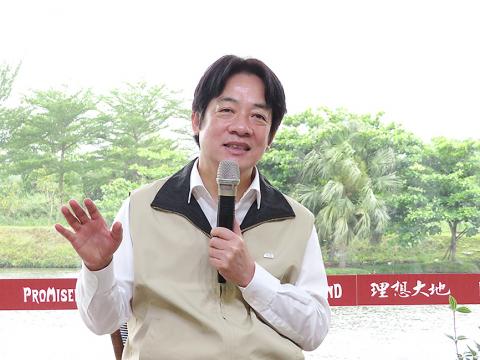Premier William Lai (賴清德) yesterday told reporters that his approach toward Taiwanese independence was pragmatic and based on three tenets.
Lai held a media roundtable in Hualien County, where reporters asked about his depiction of himself as a “political worker for Taiwanese independence.” He had once again used the term at an April 3 seminar on freedom of speech held by the Ministry of the Interior.
He said the first tenet is that Taiwan is a sovereign, independent nation and therefore does not need to declare independence, Lai said.

Photo: Lee Hsin-fang, Taipei Times
The second is that only the nation’s 23 million people have the right to decide Taiwan’s future, and the third is that building up Taiwan and making it stronger and more attractive to people so that they support it is a practical approach to Taiwanese independence, Lai said.
Working for Taiwanese independence involves safeguarding the nation’s sovereignty, protecting its freedom, democracy and human rights, and safeguarding the public’s right to decide Taiwan’s future, he added.
It also means developing the economy and creating growth so that people can live and work in peace; maintaining peaceful development and enhancing mutual understanding across the Taiwan Strait; and working with Japan, South Korea and the US to ensure security in the Asia-Pacific region, he said.
While Lai has consistently emphasized his role as a “Taiwanese independence worker,” it has taken different tones over the past year.
At the April 3 seminar, Lai recalled saying during his first administrative report to the Legislative Yuan as premier in September last year that he was a “Taiwanese independence worker,” but added: “I did not say I advocate Taiwanese independence.”
However, in that report on Sept. 26, Lai told lawmakers that when he was Tainan mayor, he had told the city council that he was a “political worker who advocates Taiwanese independence” and that “this will not change, no matter what position I am in.”
In June last year, while still mayor, Lai said he felt an “affinity toward China as much as he loves Taiwan,” and argued at the legislative hearing in September that this did not contradict his stance on Taiwanese independence.
Chinese media reported that live-fire exercises in the Taiwan Strait scheduled for Wendesday by the People’s Liberation Army on Wednesday would serve as a warning after Lai’s pro-independence statements.
However, Lai yesterday said that his support for Taiwanese independence started in the 1990s and his political beliefs are well known.

Intelligence agents have recorded 510,000 instances of “controversial information” being spread online by the Chinese Communist Party (CCP) so far this year, the National Security Bureau (NSB) said in a report yesterday, as it warned of artificial intelligence (AI) being employed to generate destabilizing misinformation. The bureau submitted a written report to the Legislative Yuan in preparation for National Security Bureau Director-General Tsai Ming-yen’s (蔡明彥) appearance before the Foreign Affairs and National Defense Committee today. The CCP has been using cognitive warfare to divide Taiwanese society by commenting on controversial issues such as Taiwan Semiconductor Manufacturing Co’s (TSMC, 台積電) investments in the

INVESTIGATION: The case is the latest instance of a DPP figure being implicated in an espionage network accused of allegedly leaking information to Chinese intelligence Democratic Progressive Party (DPP) member Ho Jen-chieh (何仁傑) was detained and held incommunicado yesterday on suspicion of spying for China during his tenure as assistant to then-minister of foreign affairs Joseph Wu (吳釗燮). The Taipei District Prosecutors’ Office said Ho was implicated during its investigation into alleged spying activities by former Presidential Office consultant Wu Shang-yu (吳尚雨). Prosecutors said there is reason to believe Ho breached the National Security Act (國家安全法) by leaking classified Ministry of Foreign Affairs information to Chinese intelligence. Following interrogation, prosecutors petitioned the Taipei District Court to detain Ho, citing concerns over potential collusion or tampering of evidence. The

‘COMPREHENSIVE PLAN’: Lin Chia-lung said that the government was ready to talk about a variety of issues, including investment in and purchases from the US The National Stabilization Fund (NSF) yesterday announced that it would step in to staunch stock market losses for the ninth time in the nation’s history. An NSF board meeting, originally scheduled for Monday next week, was moved to yesterday after stocks plummeted in the wake of US President Donald Trump’s announcement of 32 percent tariffs on Taiwan on Wednesday last week. Board members voted to support the stock market with the NT$500 billion (US$15.15 billion) fund, with injections of funds to begin as soon as today. The NSF in 2000 injected NT$120 billion to stabilize stocks, the most ever. The lowest amount it

NEGOTIATIONS: Taiwan has good relations with Washington and the outlook for the negotiations looks promising, Minister of Economic Affairs J.W. Kuo said Taiwan’s GDP growth this year is expected to decrease by 0.43 to 1.61 percentage points due to the effects of US tariffs, National Development Council (NDC) Minister Paul Liu (劉鏡清) said at a meeting of the legislature’s Economics Committee in Taipei yesterday, citing a preliminary estimate by a private research institution. Taiwan’s economy would be significantly affected by the 32 percent “reciprocal” tariffs slapped by the US, which took effect yesterday, Liu said, adding that GDP growth could fall below 3 percent and potentially even dip below 2 percent to 1.53 percent this year. The council has commissioned another institution